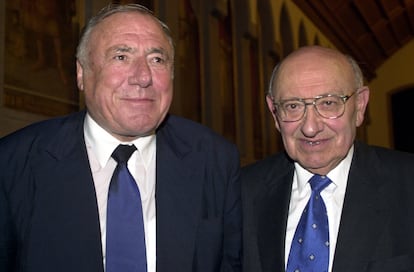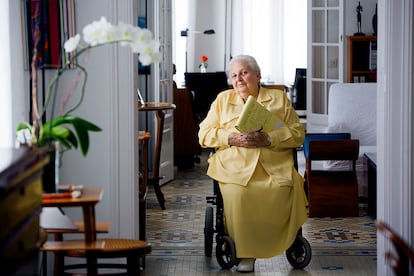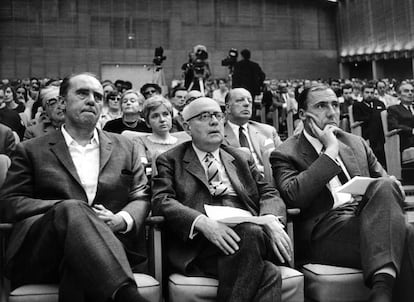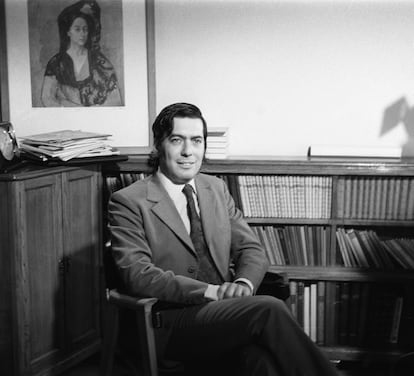It could have been news for the real estate pages, perhaps interesting for a millionaire or an investment fund, but little more. A 430-square-meter house with a garden in a wealthy neighborhood of Frankfurt was on sale for 4.1 million euros. When last June the Frankfurter Allgemeine Zeitung published that number 35 Klettenbergstrasse was going on the market, it became clear that the news was actually for the cultural pages. Because it was the Villa Unseld, the residence for decades of the publisher Siegfried Unseld (1924-2002), the halls through which the great names of world literature passed. The sale of Villa Unseld coincided with the centenary of his birth and an avalanche of editorial releases, reissues and new documents that shed light on his career and influence. A few days ago it was revealed that Hamburg businessman Dirk Möhrle, who already owned 29% of the shares, was purchasing all of Suhrkamp, the publishing house that, under Unseld’s command between 1959 and 2002, was an intellectual beacon of the new Federal Republic. Thus a fundamental chapter – or a book – in German and European culture has been closed. And the Latin American one.
“It is definitely the end of an era,” says by phone the woman who discovered to Unseld the continent, until then little known to him, of Spanish-language literature of her time. In 1973, Michi Strausfeld made a list of Latin American authors for the editor that he should publish. An adventure then began that led Unseld to have in his team two Nobel Prize winners (Octavio Paz and Mario Vargas Llosa) and three Peace Prize winners from German booksellers (the two mentioned plus Jorge Semprún). A story of literature and friendship, sometimes of friction, which is reflected in a book recently published in German, One hundred letters (One Hundred Letters), not yet translated, and in the more than 5,000 pages of Chronicles e trip reports, that Unseld regularly dictated and that since September 28, his anniversary, have been available on the internet. They are a detailed story of the professional life, of just life, of that man who “was enthusiastic about literature,” remembers Strausfeld, “with limitless curiosity and absolutely incredible energy.”
“Julio Cortázar—Octavio Paz—Alejo Carpentier. Encounters with great Latin American literature,” Unseld reviews after a trip to Paris in 1979. “The three are impressive, because they not only reflect their own, the continent itself, but also the others, at the same time and in themselves.”
The typed text can be read on the web siegfried-unseld-chronik.de. Come another about a trip to Madrid, in 1982, on the occasion of the ceremony of awarding the Cervantes Prize to Octavio Paz. Unseld writes about the reception at the Zarzuela palace: “The king and queen were affable, but they also proved to be good hosts, they were attentive to the guests, they were available to everyone, they explained to me that they always liked to come back to Germany, I conveyed the greetings of (Karl) Carstens (the federal president), which he accepted with pleasure.”

Unseld meets in Madrid with journalists, editors, authors. “Juan Bennet (sic) has received the approval of my interlocutors, also from Octavio Paz. (The editor) Jaime Salinas has rejected Rosa Chacal (sic), but Octavio Paz finds her formidable; we must study it well. Pere Gimferrer (…) is a very exact reader to whom Mrs. Strausfeld can always refer to compare her judgments.”
Strausfeld, who collaborated with him for decades from Madrid, Barcelona and Paris, treasures priceless memories. The big guy Unseld getting into Strausfeld’s tiny Fiat to go visit Mercè Rodoreda in Romanyà de la Selva (Girona). And, after the visit, the publisher campaigning among German booksellers in favor of On the Diamond Square (Diamond Square). “His relationship with the authors was very intense.”
Unseld returned to Madrid in 1990, the year of the reunification of the two Germanys. He meets Eduardo Mendoza and declares his admiration for The city of wonderss. At a reception organized by Michi Strausfeld at his home in Madrid, with authors and journalists, he coincides, among others, with Juan José Millás and Rosa Montero, “chief reporter of EL PAÍS.” “The main theme of the evening was German unity,” writes the editor. “There is also concern and fear here. Alejandro Gándara, head of literature at EL PAÍS, believed that we had to fear a new great German Reich, despite the rediscovered friendship.” One day he visits the Prado and reflects: “The Spanish were always stronger in art than in literature and music. Perhaps in Spain, as happens to us, a process is perceived by which during the democratic process the average level rises, while the summit level flattens.”

In the new One hundred lettersUnseld tells Julio Cortázar in 1980 about the vicissitudes of translating Hopscotch and the anguishing revisions to which the text is subjected due to fear of a bad review in the press. “We cannot afford to criticize the translation of this important text,” he writes. “We know it from Lenin. Trusting (in this case the translator) is fine. Control, better.”
The egos
Unseld was used to dealing with the egos of authors, some as peculiar as Thomas Bernhard or Peter Handke. But in letters he only seems on the verge of losing his patience on rare occasions. One of them is a letter to Vargas Llosa in 1988, in which he regrets the methods of Carmen Balcells, the agent of the author of The city and the dogs. “Dear Mario, our Carmen is a pain in the ass!” he complains. “Carmen,” he adds, “plays a game that, in the long term, is not the best for authors.” In one of the texts available on the internet, he complains that Balcells asks for an advance of one million marks for a novel by Isabel Allende, and describes it as “the first attempt by the mafia that has plunged the English publishing world into a crisis.” and American with this type of demands and blackmail.”

The letters and reports include Hermann Hesse, Theodor W. Adorno, Paul Celan, Gershom Scholem, Hans Magnus Enzensberger, Martin Walser, Jürgen Habermas, Emil Cioran, Marguerite Duras. Or Max Frisch and Ingeborg Bachmann, who formed a curious group with Unseld and Henry Kissinger. Another editorial novelty of the centenary tells it, Kissinger and Unseld. The friendship of two survivors (Kissinger and Unseld. The friendship of two survivors). The author, Willi Winkler, portrays an unknown Kissinger, “the friend of German literature.” This is what George Steiner meant when he coined the term “Suhrkamp culture”: high intellectuality, glamour, power. “Today a publishing house with this range of thinkers and writers is unthinkable,” summarizes Paul Ingendaay, cultural chronicler of the Frankfurter Allgemeine Zeitung. “There is no successor for a character like that.”
Unseld is no longer there, the headquarters moved from Frankfurt to Berlin years ago and the new owner, Dirk Möhrle, assures that Suhrkamp is “a cultural asset” that he promises to “protect and preserve.” And the Villa Unseld? At the end of August it became known that it had been sold to a private person. His identity has not been revealed.

